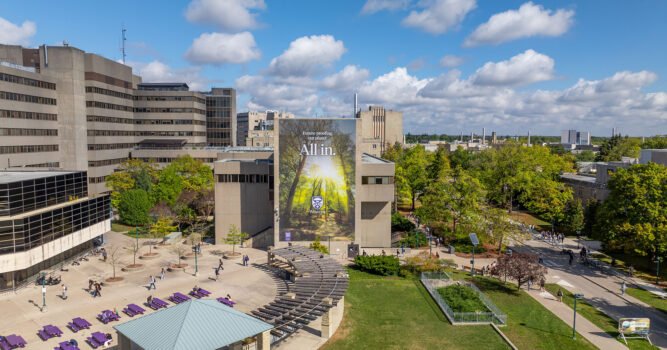Western remains among the top universities in the world, ranking 24th globally for social and environmental sustainability.
QS (Quacquarelli Symonds Limited) World University Rankings (WUR): Sustainability 2026, released this week, positions Western in the top one per cent of all universities, and fourth nationally, maintaining last year’s position.
The QS rankings provide a unique and detailed framework to assess how universities are taking action to tackle the world’s greatest environmental, social and governance challenges.
Western held its foothold, even as an additional nine Canadian institutions took part in the ranking, with a 14 per cent increase in overall participation globally. A total of 1,994 institutions were ranked, compared to 1,744 last year.
“Future-proofing our planet is a priority for Western – through teaching, research and innovative solutions put into practice on our own campus,” said Western President Alan Shepard. “Students, faculty and staff drive this sustainability work forward – I’m delighted to see their efforts continue to be recognized nationally and internationally.”
Western’s ongoing commitment to sustainability: From disaster preparedness to green energy
With an overall global score of 95.8 out of 100 – up from 94.2 last year – the latest ranking shows Western remains committed to sustainability, a key pillar in its strategic plan, Towards Western 150.
Researchers and graduate students in the Canadian Severe Storms Laboratory are helping define a national response to extreme weather by engineering storm-resilient homes and working with builders and insurers to strengthen building codes.
Experts in mechanical and materials engineering are developing next-generation EV batteries and nanomaterials with potential to solve urgent challenges related to energy storage, conversion and environmental pollution.

Western researchers are helping define Canada’s response to extreme weather by engineering storm-resilient homes and working with builders and insurers to strengthen building codes. (Canadian Severe Storms Laboratory)
The campus community is actively working towards reducing greenhouse gas emissions by 45 per cent by 2030 (relative to 2005 levels) and, led by the work of Facilities Management, Western has also pledged to achieve net-zero emissions for campus operations by 2050 or sooner. An electric boiler and a Deep Energy Retrofit program are two recent examples of initiatives helping Western to achieve these goals.
The university also tracks its progress by aligning its operations, academics and research projects with the United Nations 17 Sustainable Development Goals (SDGs) to build a better world. Western offers more than 2,700 academic courses and contributes to more than 1,900 research projects that help advance the SDGs.
Over the past three years, Western has been a consistent leader in global rankings of universities working toward the SDGs. The Times Higher Education 2025 Impact Rankings placed Western 14th overall and in the top 50 worldwide for 10 of the SDGs.

Joan Ang, manager of energy and carbon for Western Sustainability, and Bryan Lootsma, project coordinator, Facilities Management, stand in front of new and updated equipment installed during a retrofit of Siebens Drake Research Institute. (Brandon Watson/Western Facilities Management)
By the numbers: Measuring Western’s current social and environmental impact
The QS rankings measure university performance based on three assessment categories:
- Environmental impact, which accounts for 45 per cent of the total score. This category combines three indicators: environmental education, environmental research and environmental sustainability. Western ranked 30th overall.
- Social impact, which accounts for 45 per cent of the total score. This category considers five indicators: employability and opportunities, equality, health and well-being, impact of education and knowledge exchange. Western ranked 46th overall.
- Governance represents 10 per cent of the total score. This indicator assesses open decision making, ethics, student representation on governing bodies and financial transparency. Western ranked 50th overall.

(Darryl Lahteenmaa/Western Communications)
Shaping Western’s climate and sustainability strategy: Join the conversation
Heather Hyde, Western’s director of sustainability said the QS rankings “acknowledge the united efforts by the Western community to build a sustainable future together.”
Hyde said Western students, staff and faculty can make further impact by helping to shape the university’s new climate and sustainability strategy. Members of the Western community are invited to learn about and share feedback on the draft strategy plan during a virtual town hall Friday, Nov. 21.
“Designing and executing this strategy requires collective action and input from the entire campus community,” Hyde said. “This is an opportunity for everyone to get involved in advancing sustainability at Western.”









